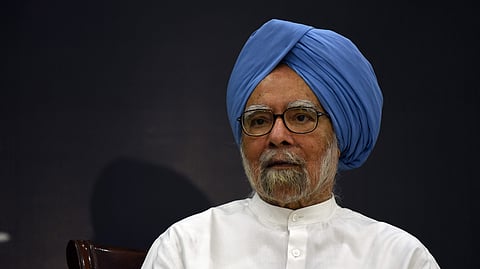'Singh is the king': Manmohan’s Delhi and Delhi’s Manmohan
It was sometime around the new year in 2003, one was at the favourite watering hole of the Congress leaders in Delhi at the Raisina Hills. Owned by the family of the late Congress MP Charanjit Singh, the hotel gave liberal discount cards to the Congress leaders.
One such leader was member of the Delhi legislative assembly from Tilak Nagar, Sardar Jaspal Singh. Since he was from the extended family of the hotel owner, he was the proud owner of the family card, which meant 100 percent discount. With talk in the town of reshuffle in Sheila Dikshit cabinet, Jaspal Singh too was trying his luck.
That evening after a ‘political discussion’ with your columnist about his chances, Jaspal Singh decided to visit his two political mentors – Manmohan Singh and Arjun Singh. He ordered two cakes, one without sugar with a lot of cream icing. The other with sugar but no cream. The former was for Manmohan Singh who was a diabetic and the second for Arjun Singh, who had cholesterol issues.
Jaspal Singh had known both the leaders closely as they had contested the South Delhi parliamentary seat at different times. Arjun Singh in 1985 by polls and won. Manmohan Singh contested from here in 1999 against Vijay Kumar Malhotra of the Bharatiya Janata Party (BJP) and lost narrowly.
Jaspal Singh, who was their prominent campaigner being from the Sikh community, next day had shared the cakes but unfortunately they had got mixed and so had his chances of getting into Dikshit cabinet nixed. This anecdote is to underline the point that Manmohan Singh, the former Prime Minister who passed away last week, was no accidental politician as one of his former aide would want the world to believe.
Born in pre-partition Punjab, Singh migrated to India post-1947 and after completing his education came to make Delhi his home. Since he found a job at Delhi School of Economics and later with the government of India, Singh became part of the national Capital. A man firmly rooted in academics, Singh associated closely with Delhi University, where his daughters studied and one of them later went to become a professor in the university.
As we approach the Delhi Assembly poll in February next year, the tenure of late Chief Minister Sheila Dikshit has become kind of benchmark for discussing model of development for the city. While indeed Dikshit was responsible for turning around the infrastructure of national Capital, she could do it as she had a very fine supporter and mentor in Manmohan Singh.
Dikshit had come to power in 1998 and had soon had a bevy detractors baying for her blood. The demand grew louder when the Congress lost all the seven parliament seats in 1999 general elections including that of Dr Manmohan Singh from South Delhi. It’s said that Manmohan Singh had countered the demand for her removal blaming the organisation in Delhifor his defeat rather than the Dikshit government.
In fact, in a mischief, then Delhi Congress leadership, just ahead of the polling day, had a held a press briefing by then state party chief Subhash Chopra and veteran Jag Pravesh Chandra, which was attended by Dr Manmohan Singh.
At this press meet it was alleged that Rashtriya Swayamsewak Sangh (RSS) was responsible for the 1984 anti-Sikh riots. This annoyed the Sikh community, who till then were wholeheartedly supporting Manmohan Singh and they voted against him.
It’s said that a powerful caucus within the Congress had planned this ‘hara-kiri’ as they viewed Manmohan Singh as the rising star as he had by then become leader of the opposition in the Rajya Sabha. But as the luck would have it, in 2004 Sonia Gandhi chose him ahead of everyone else to become Prime Minister. This came as a boon for Dikshit government in Delhi.
Dikshit had worked closely with Singh as Minister in PMO during Rajiv Gandhi’s prime ministership, Singh was then deputy chairman of the Planning Commission. They worked well together and unprecedented momentum was provided to development projects in the national Capital. Singh’s interest in Delhi was also visible in the induction of Ajay Maken in his team, first as minister of state for Urban Development and later in his cabinet.
Singh returned to campaign for the Congress on the West Delhi seat in 2009 as country’s first and only Sikh Prime Minister so far. This time, in what was considered a BJP citadel, Congress registered a huge victory. Sikhs had expressed their gratitude to the Congress for making Singh the Prime Minister, and as they ebulliently put it – Singh is the King.
Sidharth Mishra
Author and president, Centre for Reforms, Development & Justice

